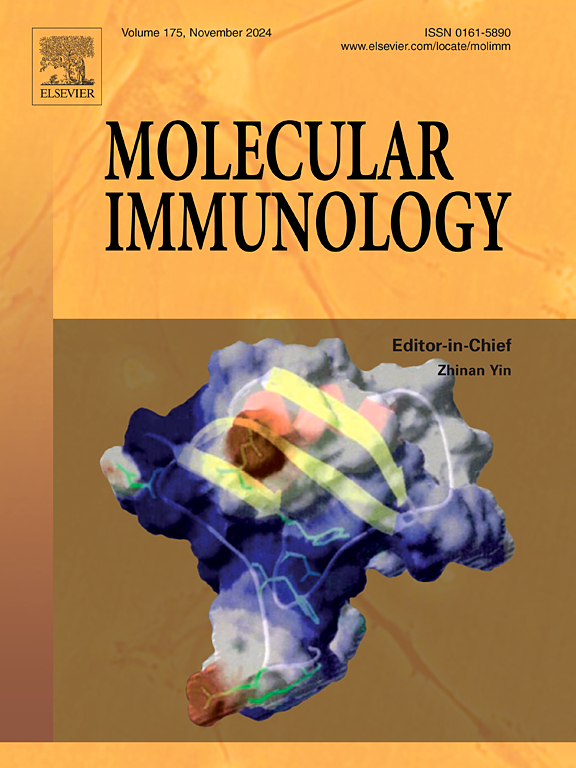肺腺癌中免疫原性细胞死亡相关基因的表达与免疫微环境相关并预测预后
IF 3
3区 医学
Q2 BIOCHEMISTRY & MOLECULAR BIOLOGY
引用次数: 0
摘要
免疫原性细胞死亡(ICD)是一种调节的细胞死亡,足以引发适应性免疫反应。越来越多的证据表明,ICD具有通过释放大量损伤相关分子模式(DAMPs)来改变肿瘤免疫微环境的潜力,这可能有助于免疫治疗的效果。我们旨在探讨肺腺癌(LUAD)中icd相关生物标志物的表达谱,并基于这些基因构建预后特征。在这项研究中,我们确定了两个与icd相关的分子亚群,它们的存活率有显著差异。集群1与良好的预后、高丰度的免疫浸润细胞和相对较高的免疫状态相关。功能分析显示,两个亚群之间的差异表达基因(DEGs)主要参与免疫应答信号传导。此外,基于11个icd相关基因建立的风险评分特征显示出预测LUAD患者预后的显著潜力。免疫谱分析表明,低风险组有明显的免疫细胞浸润,更有可能从免疫治疗中获益。综上所述,我们建立了一个新的基于ICD签名的LUAD分类体系。这种分层可以显著地指导临床实践,评估患者预后以及LUAD患者的潜在免疫治疗。本文章由计算机程序翻译,如有差异,请以英文原文为准。
Expression of immunogenic cell death-related genes is correlated with the immune microenvironment and predicts prognosis in lung adenocarcinoma
Immunogenic cell death (ICD) is a type of regulated cell death that is sufficient to prime adaptive immune responses. Mounting evidence has demonstrated that ICD has the potential to modify the tumor immune microenvironment through the release of numerous damage-associated molecular patterns (DAMPs), which may contribute to the effects of immunotherapy. We aimed to explore the expression profile of ICD-associated biomarkers in lung adenocarcinoma (LUAD) and construct a prognostic signature based on these genes. In this study, we identified two ICD-associated molecular subgroups with significantly different survival rates. Cluster 1 was associated with a favorable prognosis and a high abundance of immune-infiltrating cells and a relatively high immune status. Functional analyses revealed that the differentially expressed genes (DEGs) between the two subgroups were mainly involved in immune response signaling. In addition, a risk score signature established based on 11 ICD-related genes showed notable potential for predicting the prognosis of patients with LUAD. Analysis of immune profiles indicated that the low-risk group had noticeable immune cell infiltration and was more likely to benefit from immunotherapy. In conclusion, we established a new classification system for LUAD based on the ICD signature. This stratification can notably guide clinical practice for assessment of patient prognosis as well as potential immunotherapy for patients with LUAD.
求助全文
通过发布文献求助,成功后即可免费获取论文全文。
去求助
来源期刊

Molecular immunology
医学-免疫学
CiteScore
6.90
自引率
2.80%
发文量
324
审稿时长
50 days
期刊介绍:
Molecular Immunology publishes original articles, reviews and commentaries on all areas of immunology, with a particular focus on description of cellular, biochemical or genetic mechanisms underlying immunological phenomena. Studies on all model organisms, from invertebrates to humans, are suitable. Examples include, but are not restricted to:
Infection, autoimmunity, transplantation, immunodeficiencies, inflammation and tumor immunology
Mechanisms of induction, regulation and termination of innate and adaptive immunity
Intercellular communication, cooperation and regulation
Intracellular mechanisms of immunity (endocytosis, protein trafficking, pathogen recognition, antigen presentation, etc)
Mechanisms of action of the cells and molecules of the immune system
Structural analysis
Development of the immune system
Comparative immunology and evolution of the immune system
"Omics" studies and bioinformatics
Vaccines, biotechnology and therapeutic manipulation of the immune system (therapeutic antibodies, cytokines, cellular therapies, etc)
Technical developments.
 求助内容:
求助内容: 应助结果提醒方式:
应助结果提醒方式:


